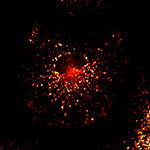Genetics, Bioinformatics and Systems Biology Colloquium
Thursdays, 12:00 pm – 1:00 pm
UC San Diego, Powell-Focht Bioengineering Hall, Fung Auditorium
Complete schedule here
Dynamics of Multifunction Brain Networks:
Neuromorphic Engineering
Organizers: Henry Abarbanel, Gert Cauwenberghs,
Katja Lindenberg and Emre Neftci
15th Floor, Building 1, Village West, UC San Diego, La Jolla, California, USA
January 7-10, 2014
Invited Lecturers:
Kwabena Boahen (Stanford Univ.) – Designing and building large-scale neuromorphic systems
Todd P. Coleman (UCSD) – Granger causality and functional connectivity in the brain
Chris Eliasmith (Univ. of Waterloo) – Large-scale spiking neural models
Stefano Fusi (Columbia Univ.) – Memory consolidation models with bidirectional interactions
Giacomo Indiveri (Univ. of Zurich) – Multiple timescales in neuromorphic plasticity circuits
Eugene Izhikevich (The Brain Corporation) – Simple models of spiking neurons
Anthony M. Lewis (Qualcomm) – The Qualcomm Zeroth processor
Rahul Sarpeshkar (MIT) – Cytomorphic systems: From cells to electronics and electronics to cells
Terrence Sejnowski (Salk Institute) – Brain communication
Gabriel Silva (UCSD) – Graph theoretic methods for descriptive & predictive analyses of cellular neural network dynamics
Angela Yu (UCSD) – Sequential decision-making in perception and cognition
This is the second gathering in an annual series of Winter Schools sponsored by the U.S. Office of Naval Research as part of its UCSD/Chicago/Berkeley MURI program in Dynamics of Multifunction Brain Networks. This year’s School and Workshop which focuses on Neuromorphic Engineering will include a “teach-in”, laboratory/poster sessions, and invited lectures on developments in VLSI technology to realize functional networks. The School is intended for all researchers, including advanced graduate students, interested in fundamental topics as well as latest advances in neuromorphic engineering ranging from computational thermodynamics, learning and memory, brain activity mapping, and silicon brains, to cognitive engineering of multifunction dynamical brain networks. Active participation is strongly encouraged and all attendees are invited to submit abstracts for poster presentation and/or interactive demonstration of their research. Selected contributed posters and demonstrations will also be highlighted in a spotlight oral session. Registration is complimentary, but required for attendance. A limited number of travel awards are available for exceptionally qualified graduate students, who should apply by having their dissertation supervisor send a letter of reference via email to muri.winter.school@nullgmail.com. Please visit us online to register and for details regarding the schedule and poster/demonstration abstract submission:













